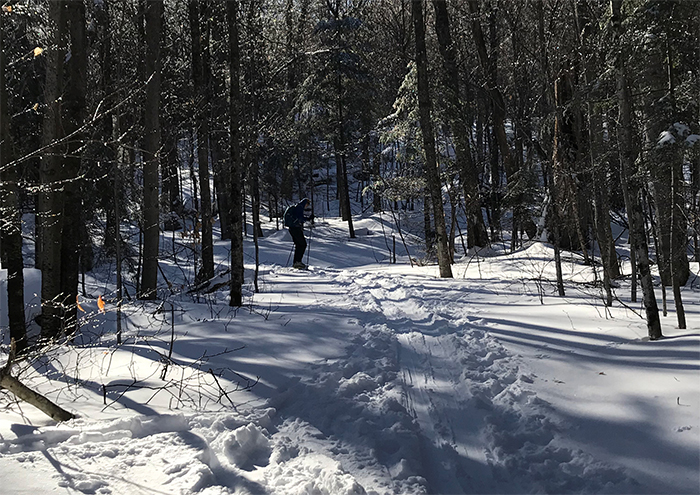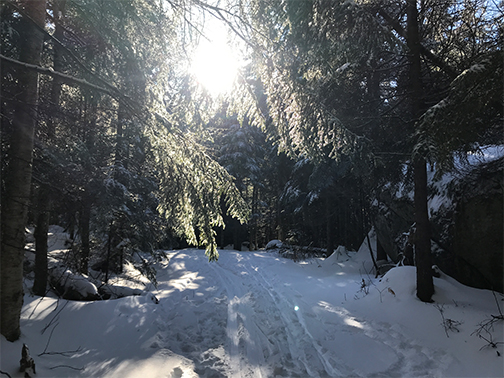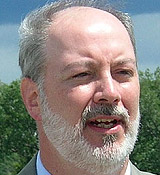
Adirondack Council Goes to Court to Fight for Wilderness
Tuesday, January 23, 2018
By: John Sheehan - Adirondack Council Director of Communications
Last Wednesday afternoon, the Adirondack Council went to court in Albany to fight a lawsuit that threatens the future of wilderness preservation in the Adirondack Park.
The lawsuit centers on the former Old Mountain Road, a trail that runs between the Town of Keene and the Town of North Elba, aka Lake Placid). The state closed this road to motor vehicles when it purchased what is now the Sentinel Range Wilderness Area. In the mid-1980s, the road bed was converted to and renamed the Jackrabbit Ski Trail for H. Smith “Jackrabbit” Johannsen who was instrumental in the development of ski trails in Lake Placid area in the 1920s.
 Old Mountain Road, aka Jackrabbit Trail
Old Mountain Road, aka Jackrabbit Trail
Starting in 2003, a local motorsports advocate (James McCulley of Lake Placid) who didn’t like the state’s decision to close the road, drove his snowmobile on the trail in protest. He said he did it in an effort to be ticketed so he could challenge the road closure in court. He was convicted in 2003, but that conviction was overturned by a judge in Essex County.
In 2005, he drove his pickup truck over the trail and was again ticketed, by a DEC forest ranger.
In 2009, then-Department of Environmental Conservation (DEC) Commissioner Pete Grannis tossed out the ticket against McCulley for driving in an off-limits area. Then Grannis declared the road open again. Unfortunately, he failed to consider key evidence in the case, including the Adirondack Park State Land Master Plan which showed the former road to be abandoned and closed as early as 1987 (The ski trail had been formally established by a local stewardship group in 1986.)
Conservationists, legal experts and Grannis’ own DEC staff objected to his decision. So did the Adirondack Park Agency, which had originally certified that the classification of the Wilderness area and the subsequent closure of the road were consistent with the Master Plan.
When Acting-DEC Commissioner Peter Iwanowicz replaced Grannis, he ordered the decision be reconsidered. In 2015, the next Commissioner, Joseph Martens, reversed the decision and declared the road closed to motorized uses again.
McCulley filed a lawsuit against the decision, but then dropped out of the case when it was transferred to the Appellate Division in Albany. However, the Town of North Elba pressed ahead with its own lawsuit in an attempt to reverse the Martens’ decision.
If the town’s legal challenge succeeds, and the court decides that the state doesn’t have a right to close roads when it acquires lands for the Forest Preserve, it would send a shock through the entire Park. It would allow lawsuits to re-open other former town roads in Wilderness Areas that are now closed.
Allowing motorized uses in Wilderness Areas would be a disaster for the Adirondacks’ most sensitive forests, and damage wetlands, water quality and wildlife habitat. All 1.1 million acres in the Park’s 21 Wilderness Area, which represents about half of all remaining wilderness east of Minnesota, would be put at risk.
While all Adirondack Forest Preserve lands are protected as “forever wild” by the NYS Constitution, Wilderness is the most protective where no mechanized travel or motors are allowed. It is designed to protect the Park’s most fragile and rare plants and animals. Less than half of the Forest Preserve lands and only one-sixth of the entire Park is classified as Wilderness.
Wilderness is also what sets the Adirondack Park apart from other places in the Northeast. It is both the ecological and economic backbone of the Adirondack Park. The Adirondacks have large tracts of forest where nature is the dominant force. People come from all over the world to experience that for the first time. They keep coming back because it doesn’t exist where they live.
So, the stakes are huge in this case. That’s why the Adirondack Council petitioned to become a party to the lawsuit and is defending decisions made by the state. A decision is expected from the Appellate Court in March 2018.
Please consider making a contribution for Adirondack Park Legal Defense to help the Council obtain legal expertise and critical research, and to take legal action to protect and uphold the integrity of Wilderness in the Adirondacks. Thank you! Click HERE to contribute now.
|





